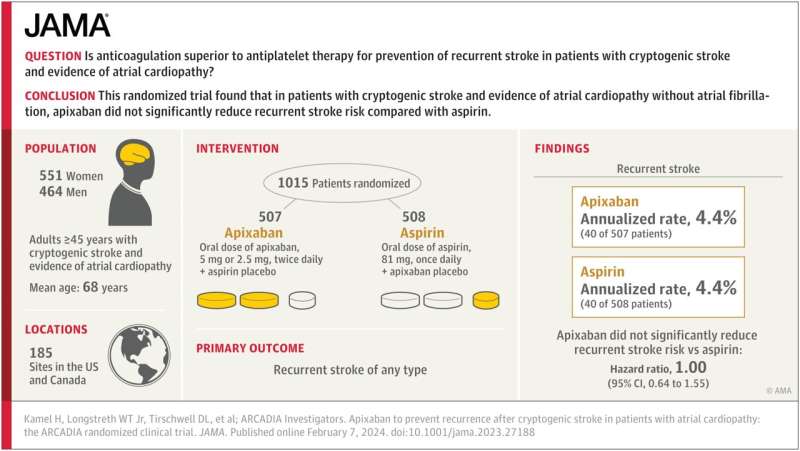This article has been reviewed according to Science X's editorial process and policies. Editors have highlighted the following attributes while ensuring the content's credibility:
fact-checked
trusted source
proofread
Anticoagulants fail to prevent unexplained strokes, clinical trial finds

A common practice of prescribing anticoagulants to people who have had unexplained strokes should stop, according to a study led by researchers at Columbia, Weill Cornell Medicine, and the University of Washington and published in JAMA.
Anticoagulants were thought to prevent additional strokes in people whose initial stroke has an unknown cause but who have a heart condition, atrial cardiopathy, that resembles atrial fibrillation, a common cause of stroke.
"We know these drugs work for people with atrial fibrillation, so we thought that they would probably work for people with atrial cardiopathy as well," says Mitchell Elkind, MD, professor of neurology at the Vagelos College of Physicians and Surgeons and one of the study's leaders. "That was the basis for the trial."
However, the trial of 1,015 people found that patients with atrial cardiopathy who were given the anticoagulant apixaban had the same stroke rate, 4.4%, as patients who were given aspirin, the current standard of care.
"It's disappointing as a physician-scientist to not have your hypothesis proven, but this study is still providing really useful information," Elkind says. "It tells neurologists that patients with this type of heart condition, atrial cardiopathy, should not get anticoagulants, which are riskier than aspirin and should be reserved for people with definitive evidence of atrial fibrillation."
The mystery of unexplained strokes
One-third of strokes have unknown causes, a challenge for neurologists trying to help their patients avoid subsequent strokes.
"We know what to do with people who have atrial fibrillation: We put them on anticoagulants to prevent clots. We know what to do with people who have a blockage in the carotid artery: We operate to open the artery," says Elkind. "But for one in three people whose stroke is unexplained, there's always been uncertainty."
Based on years of research, Elkind and a group of neurologists, including Hooman Kamel from Weill Cornell Medicine and colleagues from the University of Washington, thought they had found an answer: Many people who have unexplained strokes have changes in their heart that resemble changes seen in AFib.
Since these atrial changes appear to trigger clots like AFib, and anticoagulants successfully reduce stroke in patients with AFib, anticoagulants should also work to reduce clots and second strokes in patients with atrial cardiopathy.
Several epidemiological studies backed the idea, with the strongest data coming from a large stroke prevention study led by Columbia's J.P. Mohr in the 90s. An analysis of the stored blood samples from that study showed that anticoagulants were associated with fewer strokes in patients with biomarkers for atrial cardiopathy but not in other patients with unexplained strokes.
For many physicians, the idea was compelling, even without evidence from a prospective, randomized trial. "If you believed that your patient's unexplained stroke really came from an embolism from the heart, the idea that you should prescribe anticoagulants was hard to shake," Elkind says. "And so a lot of people were using them."
The right treatment for the wrong patients?
Elkind and Kamel say there are several possible reasons why the trial did not support their hypothesis, including that they tested the right treatment in the wrong patients.
"In my mind, the next step is not to throw away the concept of treating atrial cardiopathy," Elkind says, "but to see if there are indicators that do a better job at identifying patients who would benefit from anticoagulants."
The trial included patients who had one of three biomarkers of atrial cardiopathy, all of which had been associated with the risk of stroke, but the condition is not yet well-defined, and other biomarkers exist.
Another possibility is that other factors, including atherosclerosis, smoking, or high blood pressure, were responsible for the unexplained strokes of the participants. If so, targeting atrial cardiopathy would not have a big impact in preventing subsequent strokes.
The researchers are now discussing the next steps, including the feasibility of future trials. "We need to know how many patients could really benefit. Is it such a small proportion of patients we wouldn't be able to recruit enough patients?" Elkind says.
"I'd like to think that we just took a half step in the wrong direction, and we just need to continue in a slightly different direction to identify the right population of patients, so those are the kinds of questions we still need to answer."
More information: Hooman Kamel et al, Apixaban to Prevent Recurrence After Cryptogenic Stroke in Patients With Atrial Cardiopathy: The ARCADIA Randomized Clinical Trial, JAMA, (2024). DOI: 10.1001/jama.2023.27188 jamanetwork.com/journals/jama/fullarticle/2814933



















